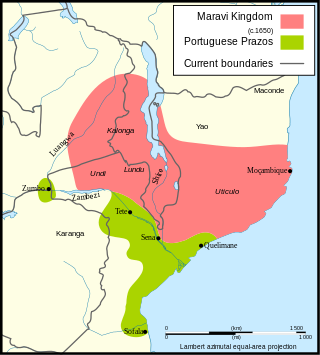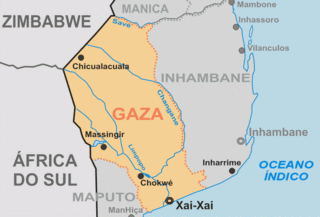The history of Malawi covers the area of present-day Malawi. The region was once part of the Maravi Empire. In colonial times, the territory was ruled by the British, under whose control it was known first as British Central Africa and later Nyasaland. It becomes part of the Federation of Rhodesia and Nyasaland. The country achieved full independence, as Malawi, in 1964. After independence, Malawi was ruled as a one-party state under Hastings Banda until 1994.

The Tumbuka are a Bantu ethnic group found in Malawi, Zambia and Tanzania. Tumbuka is classified as a part of the Bantu language family, and with origins in a geographic region between the Dwangwa River to the south, the North Rukuru River to the north, Lake Malawi to the east, and the Luangwa River. They are found in the valleys near the rivers, lake as well as the highlands of Nyika Plateau, where they are frequently referred to as Henga although this is strictly speaking the name of a subdivision.

The Ndwandwe–Zulu War of 1817–1819 was a war fought between the expanding Zulu Kingdom and the Ndwandwe tribe in South Africa.

The Ndwandwe are a Bantu Nguni-speaking people who populate sections of southern Africa. They are also known as the Nxumalo's

Chipata is a city and administrative centre of the Eastern Province of Zambia and Chipata District. It was declared the 5th city of the country, after Lusaka, Ndola, Kitwe and Livingstone, by President Edgar Lungu on 24 February 2017. The city has undergone rapid economic and infrastructure growth in the years, leading up to city status.

Maravi was a kingdom which straddled the current borders of Malawi, Mozambique, and Zambia, in the 16th century. The present-day name "Maláŵi" is said to derive from the Chewa word malaŵí, which means "flames". "Maravi" is a general name of the peoples of Malawi, eastern Zambia, and northeastern Mozambique. The Chewa language, which is also referred to as Nyanja, Chinyanja or Chichewa, and is spoken in southern and central Malawi, in Zambia and to some extent in Mozambique, is the main language that emerged from this empire.

Eastern Province is one of Zambia's ten provinces. The province lies between the Luangwa River and borders with Malawi to the east and Mozambique to the south, from Isoka in the northeast to the north of Luangwa in the south. The provincial capital is Chipata. Eastern province has an area of 51,476 km2 (19,875 sq mi), locally shares border with three other provinces of the country and is divided into fifteen districts.
Soshangana Ka Gasa Zikode, born Soshangana Nxumalo, was the Founder and the Monarch of the Gaza Empire, which at the height of its power stretched from the Limpopo river in southern Mozambique up to the Zambezi river in the north. Soshangana ruled over the Gaza state from 1825 until his death in 1858. Soshangana was also known by the name of Manukosi.

The Gaza Empire (1824–1895) was an African empire established by general Soshangane and was located in southeastern Africa in the area of southern Mozambique and southeastern Zimbabwe. The Gaza Empire, at its height in the 1860s, covered all of Mozambique between the Zambezi and Limpopo rivers, known as Gazaland.

The Nguni people are a linguistic cultural group of Bantu cattle herders who migrated from central Africa into Southern Africa, made up of ethnic groups formed from iron age and proto-agrarians, with offshoots in neighboring colonially-created countries in Southern Africa. Swazi people live in both South Africa and Eswatini, while Ndebele people live in both South Africa and Zimbabwe.
Inyandezulu Inkosi Yamakhosi Mphezeni KaZwangendaba is the King of the Ngoni people of Eastern Province, East Africa and Malawi's Mchinji district.

The Zulu Kingdom, sometimes referred to as the Zulu Empire, was a monarchy in Southern Africa. During the 1810s, Shaka established a standing army that consolidated rival clans and built a large following which ruled a wide expanse of Southern Africa that extended along the coast of the Indian Ocean from the Tugela River in the south to the Pongola River in the north.

The following outline is provided as an overview of and topical guide to Zambia:
Zambia, officially known as the Republic of Zambia, is a landlocked country in Southern Africa. The neighbouring countries are the Democratic Republic of the Congo to the north, Tanzania to the north-east, Malawi to the east, Mozambique, Zimbabwe, Botswana, and Namibia to the south, and Angola to the west. The capital city is Lusaka, located in the southeast of the country. The population is concentrated mainly around the capital and the Copperbelt to the northwest.
Ngoni is a Bantu language of Zambia, Tanzania, and Mozambique. There is a 'hard break' across the Tanzanian–Mozambican border, with marginal mutual intelligibility. It is one of several languages of the Ngoni people, who descend from the Nguni people of southern Africa, and the language is a member of the Nguni subgroup, with the variety spoken in Malawi sometimes referred to as a dialect of Zulu. Other languages spoken by the Ngoni may also be referred to as "Chingoni"; many Ngoni in Malawi, for instance, speak Chewa, and other Ngoni speak Tumbuka or Nsenga.
Lubimbi people are scattered all over Africa, mostly found in Southern Africa. Notable countries being South Africa, Zimbabwe, Mozambique, Zambia, Democratic Republic of Congo, Tanzania and Uganda.
Leroy Vail whose birth name was Hazen Leroy Vail, was an American specialist in African studies and educator who specialized in the history and linguistics of Central Africa and later extended his interests to Southern Africa. He taught in universities in Malawi, Zambia and the United States and his research in the first two countries inclined him toward the view that Central Africa underwent a period of underdevelopment that began in the mid-19th century and accelerated under colonial rule. After his return to the United States, he cooperated with Landeg White on studies of colonial Mozambique and on the value of African poetry and songs as a source of oral history.
Zongendawa Jere or Inkosi Ya Makhosi M'mbelwa IV was the King of the Ngoni and Tumbuka people in Malawi, Zambia and Tanzania. He passed away in February 2013 at Mwaiwathu Private Hospital in Malawi's commercial city, Blantyre, where he was diagnosed with diabetes attack and hypertension. At his death, he was 60 years old. His son, M'Mbelwa V, inherited the crown in 2013.

The Ngoni Kingdom, sometimes referred to as the Ngoni Empire or the Kingdom of Ngoni, is a monarchy in Southern Africa that started in 1815 when some of the Nguni of South Africa broke away from the Zulu Kingdom and escaped to Malawi.
Zwangendaba Gwaza kaZiguda Jele Gumbi, commonly known as Zwangendaba (1785–1848) was the first king of the Ngoni and Tumbuka people of Malawi, Zambia and Tanzania of the Jere Ngoni Clan from 1815 to 1857. He passed away in July 1848 and his son, Gwaza Jele, inherited his position soon after his death. He was the older brother of Somkhanda kaZiguda Jele who was also known as Gumbi and founded the Gumbi clan in Kwazulu-Natal in areas of Pongola.















